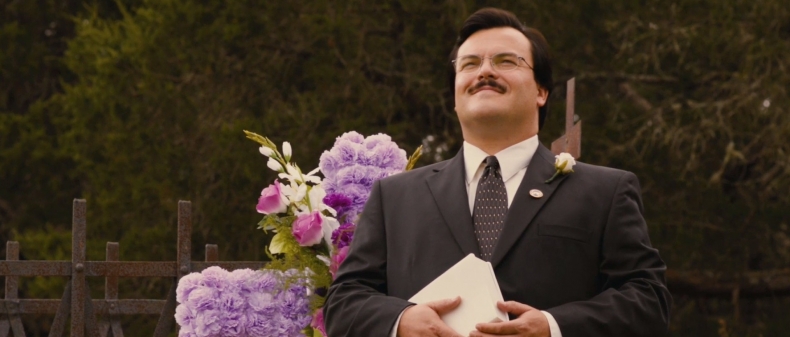
“Bernie”
Richard Linklater’s gentle true-crime comedy Bernie, about the 1998 murder of an 81-year-old East Texas woman by her 39-year-old male companion, is a look at the highly flexible nature of Southern American morals. The townspeople of Carthage, who relate the story in a quasi-documentary, talking-heads style, are willing to forgive the title character everything–murder, stealing, even his presumed homosexuality–for no other reason than that they like him and that they couldn’t stand the woman he killed. Bernie Tiede, they explain, was an “angel,” and “just made ya feel real good about yerself,” whereas Marjorie Nugent was the meanest woman in Carthage, someone people “woulda shot fer five dollars.” Linklater, a Texan himself, recruited actual locals to play the townspeople, and he and co-writer Skip Hollandsworth took much of their folksy dialogue directly from Hollandsworth’s Texas Monthly article on the case. It was an inspired move, and it helps to make Bernie one of the most enormously likeable hunks of down-home Americana since Michael Ritchie’s all-but-forgotten 1975 classic Smile. (Linklater may have been influenced by that film, and also by Ritchie’s 1993 HBO movie, The Positively True Adventures of the Alleged Texas Cheerleader-Murdering Mom.) Like Smile, Bernie isn’t flawless, but it’s so amiable and so perceptive about ordinary people that its flaws barely seem to matter in the end.
After a tone-setting title card–”What you’re fixin’ to see is a true story”–we see the cheerfully square Bernie driving the pretty streets of Carthage with the windows rolled down, singing along to “Love Lifted Me.” But because Bernie is played by Jack Black, possibly the most disingenuous actor alive (after Bill Murray), it’s not at all clear how we’re supposed to take this. For a good while, I thought Bernie was meant to be a con artist. Later, when it became clear his god-and-apple-pie persona was more or less legit, I thought Black had been horribly miscast. But Black never steps out of character–he never even threatens to–and by the end I had trouble imagining anyone else in the role. The tension between who Black is and who the character is works for the film, because the real-life Bernie was all contradictions, too. Did the chipper mortician–who was almost certainly gay–really love the conveniently rich Marjorie Nugent, a mean, domineering woman more than 40 years his senior? If not, how did he convince her and the rest of the town otherwise? And if so, how could he shoot her and stuff her body in a deep freezer for nine months?
Once you get used to the performance, Black is phenomenal as Bernie. Despite the wild-man persona he’s built up in his previous films, there’s always been something meticulous, almost fussy, about him, and he uses this to reveal the elements of calculation in Bernie’s behaviour. Bernie is genuinely nice and generous, but he also wants things done his way, and by disarming people he encourages them to hand over a degree of control: Marjorie lets him run her finances, the church lets him choose what hymns to sing, and the local arts guild lets him take over their musical productions. Black’s Bernie is a hustler who doesn’t know he’s hustling, and there’s joy in seeing his hustles come to fruition–he’s on top of the world when he gets to lead the church choir or play the title role in The Music Man, and the actor seems on top of the world, too. Suddenly, Black’s seemingly endless reserves of energy get full outlet.
Several other critics have argued that Bernie remains too much of an enigma due to Linklater’s distancing, mock-doc approach, and there’s something to that complaint. Linklater clearly loves hearing the townspeople’s honest, uncensored interpretations of events, and he’s right to–they give the movie an authentic regional tang. But he leans on them too hard at times: the story isn’t always allowed to tell itself, and the characters’ motivations are too often left obscure. But I’d argue it’s Shirley MacLaine’s performance as Marjorie that suffers most. MacLaine’s dried-up old harpy is a hoot, but Linklater never lets us get close enough to learn what makes her tick. To an extent, this is by design–what matters here isn’t who Marjorie really was but how the townspeople saw her–but it prevents MacLaine from delivering a full performance, and it prevents us from understanding why Marjorie acts the way she does. Initially, Bernie’s attentions turn Marjorie into a giddy schoolgirl, but later she returns to her old ways and starts treating him like crap, and we never grasp what triggered the change. Still, MacLaine makes a great cartoon meany. Even in her most mundane acts–chewing food or sweeping leaves off the sidewalk–she conveys the surly humour of the perpetually annoyed.
In the role of Danny Buck Davidson, the D.A. who prosecuted Tiede, Matthew McConaughey spends the first two thirds of the film as just one more talking head, and it feels as if he’s being wasted. But once he becomes a player in the story, he blooms and delivers a sly, ingratiating performance. Danny Buck is the only man in town who wants Bernie jailed, and he has to use all his powers of persuasion and rhetoric to sway the public to his side. During the trial (which has to be moved to a neighbouring county in order to find jurors who won’t automatically let Tiede off), McConaughey lets us see the relish Danny Buck takes in a challenge, and he has a great moment when he turns Bernie’s own sophistication against him: he slyly mispronounces Les Misérables, letting Bernie correct him and alerting the jury to his high-falutin’ airs.
In the end, the strange case of Bernie Tiede and Marjorie Nugent remains a moral puzzler. Though the denizens of Carthage adore Bernie and believe he deserves forgiveness, they also know what he did was wrong and that it needs punishing. Linklater, one of the most generous of directors, lets them grapple with their feelings throughout the film, and the result is a satisfying and deeply affectionate symphony of Southern moral relativism.
____
Scott MacDonald writes about cinema for Toronto Standard.
For more, follow us on Twitter: @TorontoStandard and subscribe to our Newsletter.














